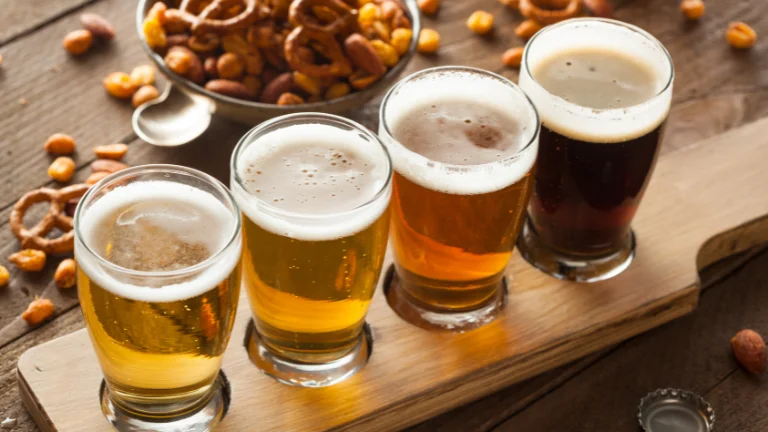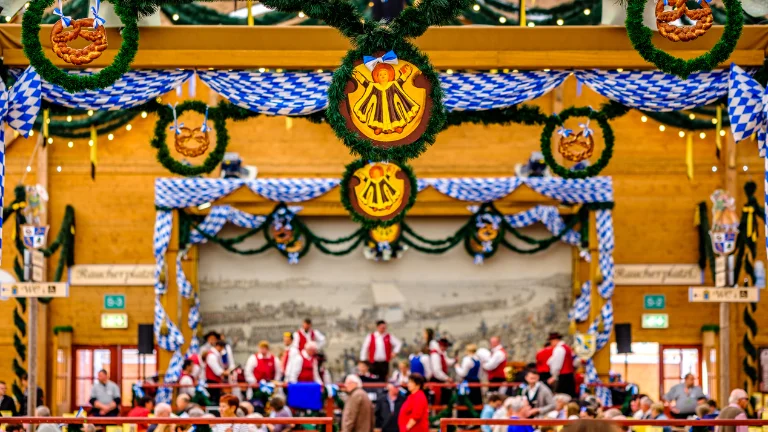Did you know the average Oktoberfest attendee drinks nearly 1.5 liters of beer?
But not just any beer—these are traditional brews steeped in centuries of Bavarian history. As the autumn leaves start to fall and the season’s chill settles in, Munich transforms into a haven for beer enthusiasts worldwide. Welcome to Oktoberfest, where the beer flows freely, and the spirit of celebration is as rich as the brews themselves.
Rich History of Oktoberfest Beer
Oktoberfest, known locally as “Wiesn,” has a history that dates back to 1810. It began as a royal wedding celebration but quickly evolved into an annual festival celebrating Bavarian culture, with beer at its heart. The beers served during Oktoberfest are a specific style known as Märzen, a lager brewed in March and stored in cool cellars to be enjoyed during the festival.
READ MORE: 15 famous traditions of Oktoberfest festive.
Types of Traditional Oktoberfest Beer
1. Märzen:
Märzen is the classic Oktoberfest beer, characterized by its medium to full body, malty flavor, and clean, dry finish. It typically has a deep amber color and a slightly higher alcohol content of generally around 5.8% to 6.3% ABV (alcohol by volume) compared to standard lagers.

2. Festbier
A lighter, more golden version of Märzen, Festbier has a balanced malt character with a hint of hop bitterness. It is smoother and easier to drink, making it perfect for large quantities throughout the festival. The alcohol content of the beer is usually between 5.5% and 6.2% ABV.
The Six Original Breweries of Munich
Munich’s beer culture is renowned worldwide, and six breweries hold the honor of being the original purveyors of Oktoberfest beer. Each has a unique story and a signature brew that embodies the essence of Bavarian tradition.
1. Augustiner-Bräu
It is Munich’s oldest independent brewery, Founded in 1328. Known for its adherence to traditional brewing methods, it remains a favorite among locals and visitors alike.
Signature Brew: Augustiner Oktoberfestbier, a rich, malty Märzen with a well-balanced flavor profile.
Alcohol Content: Approximately 6.3% ABV.
2. Paulaner
Established in 1634 by monks of the Minim order, Paulaner has a deep-rooted history in Munich. The brewery’s dedication to quality and tradition is evident in every pint.
Signature Brew: Paulaner Oktoberfest Bier, a golden Festbier with a smooth, slightly sweet taste.
Alcohol Content: Around 6.0% ABV.
3. Hacker-Pschorr
Dating back to 1417, Hacker-Pschorr has been a staple of Munich’s beer scene for over 600 years. The brewery’s commitment to traditional brewing techniques has preserved its reputation for excellence.
Signature Brew: Hacker-Pschorr Oktoberfest Märzen, a deep amber beer with robust malt flavors and a clean finish.
Alcohol Content: Approximately 5.8% ABV.
4. Hofbräu München
Founded in 1589 by the Duke of Bavaria, Hofbräu München is synonymous with Oktoberfest. Its beers are known for their quality and consistency, making them a favorite at the festival.
Signature Brew: Hofbräu Oktoberfestbier, a light, golden Festbier with a balanced malt and hop profile.
Alcohol Content: Around 6.3% ABV.
5. Löwenbräu
Löwenbräu, which translates to “Lion’s Brew,” has been a part of Munich’s brewing landscape since 1383. Its strong association with Oktoberfest is evident in its signature brew.
Signature Brew: Löwenbräu Oktoberfestbier, a full-bodied Märzen with a rich malt character.
Alcohol Content: Approximately 6.1% ABV.
6. Spaten-Franziskaner-Bräu
Spaten, established in 1397, and Franziskaner, founded in 1363, merged to form a brewing powerhouse. Their dedication to traditional brewing has earned them a prominent place in Oktoberfest history.
Signature Brew: Spaten Oktoberfestbier Ur-Märzen, a well-balanced Märzen with a smooth, malty flavor.
Alcohol Content: Around 5.9% ABV.
Understanding Alcohol Percentage
Oktoberfest beers are distinct in their brewing process and ingredients. The two primary types—Märzen and Festbier—offer a unique drinking experience, each with its flavor profile and alcohol content.
- Märzen: As mentioned, Märzen is brewed in March and stored until the festival. Its higher alcohol content (5.8% to 6.3% ABV) is a result of the longer fermentation process, which also gives it a richer, more robust flavor.
- Festbier: Introduced more recently, Festbier is a lighter, more drinkable option with an alcohol content of 5.5% to 6.2% ABV. Its golden hue and balanced taste make it a popular choice for those looking to enjoy multiple rounds.
The Brewing Process
The traditional brewing process for Oktoberfest beer follows the Reinheitsgebot, or German Beer Purity Law, which dictates that only water, barley, and hops can be used. This ensures the highest quality and authenticity.
- Lagering: The beer is stored in cool cellars for several months, allowing it to mature and develop its flavor.
- Mashing: The barley is mashed with water to convert the starches into fermentable sugars.
- Boiling: The mash is boiled, and hops are added for bitterness and aroma.
- Fermentation: The wort (unfermented beer) is cooled and yeast is added, initiating fermentation.
Munich Brands
Munich’s brewing heritage is showcased through its esteemed beer brands, each contributing to the Oktoberfest experience. Let’s take a closer look at some notable brands beyond the original six breweries.
- Giesinger Bräu
- History: One of the newer breweries in Munich, Giesinger Bräu was founded in 2006 but has quickly gained popularity for its high-quality, traditionally brewed beers.
- Notable Brews: Giesinger Märzen, a traditional Märzen with a modern twist.
- Alcohol Content: Around 5.6% ABV.
- Schneider Weisse
- History: Established in 1872, Schneider Weisse specializes in wheat beers but also offers traditional lagers during Oktoberfest.
- Notable Brews: Schneider Weisse Festbier, a well-rounded Festbier with a hint of banana and clove from the wheat yeast.
- Alcohol Content: Approximately 6.2% ABV.
Global Influence

The influence of Oktoberfest beer extends far beyond Munich. Breweries worldwide craft their versions of Märzen and Festbier, inspired by the traditional methods and flavors of the original six breweries. This global reach has made Oktoberfest a celebrated event in numerous countries, each adding its unique twist to the festivities.
Pairing Oktoberfest Beer with Food
Pairing Oktoberfest beer with food can enhance the drinking experience. Here are some classic pairings:
- Märzen: Pairs well with roasted meats, sausages, and hearty stews. The maltiness complements the rich flavors of the meat.
- Festbier: Perfect with lighter fare such as grilled chicken, salads, and seafood. The crispness of the beer balances the lighter flavors of the food.
Visiting the Breweries
For those who want to immerse themselves in the Oktoberfest experience, visiting the breweries in Munich is a must. Each brewery offers tours where you can learn about their history, and brewing process, and, of course, sample their beers.
Take Over
From the robust Märzen to the refreshing Festbier, each sip tells a story of centuries-old brewing traditions upheld by Munich’s renowned breweries. Whether you’re a seasoned beer enthusiast or a curious newcomer, Oktoberfest offers a taste of Bavarian heritage that is sure to leave a lasting impression. So raise your stein, toast to good times, and immerse yourself in the rich legacy of Oktoberfest traditional beer.